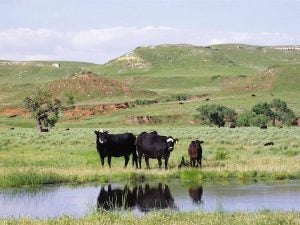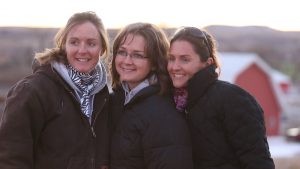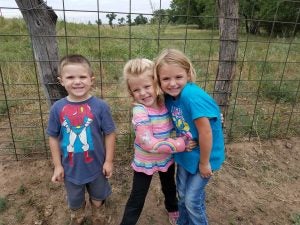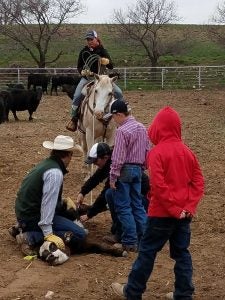Four houses, the ranch office, a machinery shed, a barn, a shop, a hay shed, half of a sizeable cow herd, and every blade of grass across 28,000 of the ranch’s 30,000 acres was lost to the Giles Ranch after the fires that raged across four Plains states this past spring.
Roger and Kathy Giles along with three of their daughters, Jenny Betschart, Molly Beckford, and Katie Shaw, operate this commercial Angus operation in southwest Kansas near Ashland, a community that was hit particularly hard by the fires. Moving forward, time is marked as “prior to the fire” and “after the fire” — but the future is promising.
In late summer, one of the houses on the ranch is framed and has windows while two of the others are expected to begin construction in the coming weeks and months. The sisters’ children have returned to school, half of the fence lost has been rebuilt, and some semblance of routine is beginning to take shape.
“We had a good summer,” Betschart said. “We had good rain, good grass and regrowth, and a good wheat harvest.”

Perhaps the most exciting news is Katie and Brett Shaw’s baby daughter, due in December and bringing the biggest highlight of 2017.
One of the most challenging parts of rebuilding was planning the rebuilding of the cow herd. With thousands of miles of fence to build, homes to rebuild, and the chaos that comes with disaster, the family has only recently been able to truly sit down as a family and devise a plan. It is the family’s hope that the cow herd will be rebuilt by 2019.
“We’re closer,” she said. “We were close before but we’re even closer now. We received so much that we’re looking forward to finding ways to pay it forward.”
As fires burned recently in Montana, ranchers in the Ashland, Kansas, area were able to gather hay and fencing supplies to send to those in need. The images of the fire brought back vivid memories, and Betschart said it was heartwarming to see those trucks take help in the form of hay to their neighbors to the north.
“When [the fire] happened, with all the political things happening, people in agriculture were looking for something to rally around,” she said. “It was nice to see positive things in your Facebook feed and to be a part of something bigger than yourself.”

Rebuilding lives has truly taken a community of people and more help than the family could have ever anticipated, proving that the community of those in agriculture is without boundaries.
“We couldn’t have done it without the help we received,” she said. “After a while you don’t want to take any more, and our whole community is tired of taking and was ready to be able to give.”
In 2012, Betschart and her sisters began a retail beef business selling beef raised on the ranch. Customers are primarily local and looking for a healthy, local source of beef that the Giles Ranch Beef Company has been able to provide while offering the ranch another method to market its product. Cattle are raised on the ranch, fed at Shaw Feedyard, which is the family feedyard owned by Katie (Giles) and Brett Shaw’s family, and then processed at a federally inspected facility either in Kiowa or McPherson, Kansas.
The fully stocked, refrigerated beef trailer was one of the few things on the ranch spared by the fire. It was taken to the sisters’ aunt and uncle’s home nearby in the days following the fire and was able to be returned in early summer, allowing the sisters to be back in business.

On a recent trip to Wichita, Betschart’s 10-year old son asked, “Mom, how long until it feels like home again?”
While home may look and feel different, the Giles Ranch family is moving forward with, Betschart said, gratitude, positive attitudes, and a deep desire to be better and do more for other people after feeling the outrageous generosity of so many.
“Our family and community as a whole are very appreciative of the help we’ve received,” she said. “We appreciate everything our neighbors in agriculture have done. It’s overwhelming but it’s amazing to remember all of the things, large and small, that were done.”




